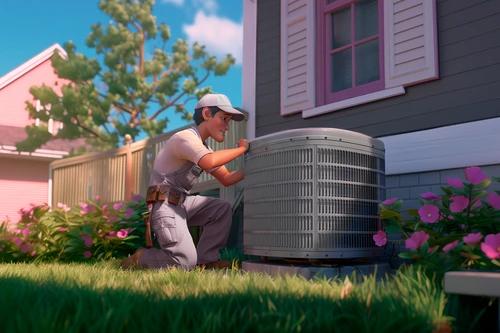How Much Does It Cost to Replace an AC Unit in North Carolina?

If you live in North Carolina or have ever spent a summer there, you know the heat can be brutal – with temperatures soaring into the mid-80s to 90s and humidity that sticks around. Whether your old air conditioner is struggling to keep up or you’re simply ready for an upgrade, you’re probably wondering: How much does a new air conditioner in North Carolina cost?
HVAC.com breaks down the typical price ranges of a new AC unit in North Carolina, the key factors that affect your final cost, and the benefits of investing in a new system.
Average AC Replacement Cost in North Carolina
For a standard-sized home in North Carolina, most homeowners will need about a 3-ton system. These units are designed to cool around 1,500-2,000 square feet. Here’s what you can typically expect to pay:
- 3-ton AC + Furnace System: $10,500 to $13,500
- 3-ton Heat Pump + Air Handler: $10,000 to $13,000
- 3-ton AC Condenser + Air Handler: $9,500 to $12,500
These prices include both equipment and professional installation. Keep in mind, this is a rough estimate; your specific project might land outside this range depending on a few key details.
What Impacts the Price of a New AC in North Carolina?
Not all air conditioners are created equal, and the cost to install one in the Tar Heel State can vary depending on several important factors:
1. Cooling Capacity
An oversized or undersized system can lead to uneven cooling and higher utility bills. This is why professional sizing is so important. HVAC pros use load calculations to make sure your system fits your home – not just square footage, but insulation, layout, the number of windows, and much more.
2. Brand
Just like cars or appliances, air conditioner brands vary in quality, reputation, and pricing. Premium brands may cost more up front but tend to offer better reliability, performance, and longer warranties. That can pay off in the long run, especially when you need service or replacement parts.
3. Efficiency Ratings (SEER2)
In North Carolina, you’ll need an air conditioner that meets the latest SEER2 efficiency standards (minimum of 14.3 for the Southeast). Higher-efficiency units cost more initially, but they’ll help lower your monthly energy bills – a big win during those hot Carolina summers.
4. Motor Type
Air conditioners can have single-stage, two-stage, or variable-speed motors. The more advanced the motor, the better the system is at maintaining steady temps and pulling moisture out of the air, which is especially helpful in NC’s humid climate. As you'd expect, these high-performance motors also come with a higher price tag.
5. Upgrades & Smart Features
Want a smart thermostat, air purification system, or whole-house dehumidifier? These extras might bump up the final cost by a few hundred dollars or more, but they also boost your home’s comfort and indoor air quality.
6. Installation & Labor
Finally, don’t forget to account for labor costs. Labor costs in North Carolina vary based on the complexity of the job and the time of year. If your install involves replacing ductwork, relocating your unit, or upgrading your thermostat, that can add to the total. Also, installation tends to be more expensive during peak summer months when HVAC companies are busiest.
The Benefits of Upgrading Your Air Conditioning System
- Lower Energy Bills: Modern systems are much more efficient than those from just 10 or 15 years ago. That efficiency means you’ll likely see noticeable savings on your energy bills month after month.
- Better Indoor Comfort: New air conditioners manage temperature and humidity better. You’ll enjoy more consistent cooling, fewer hot spots, and a more comfortable living space overall.
- Increased Home Value: If you’re thinking about selling your home, a new HVAC system is a major plus. Buyers see a new AC as one less thing to worry about – and that can help your home sell faster.
- Less Risk of Breakdowns: Older units are more likely to fail, often at the worst possible time. A new air conditioner means fewer emergency calls and less stress during heatwaves.
- Updated Technology: From Wi-Fi thermostats to air purifiers, today’s systems offer tech upgrades that make your home more comfortable, convenient, and healthier to live in. These smart features also give you more control over your system, whether you’re home or away.
